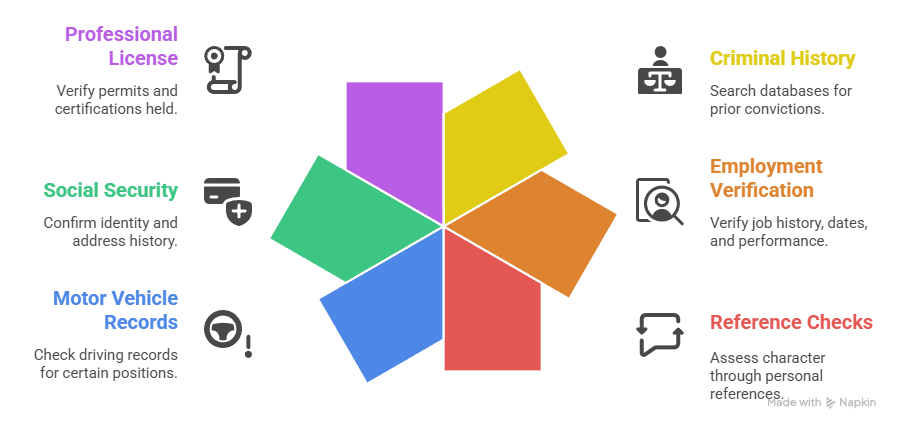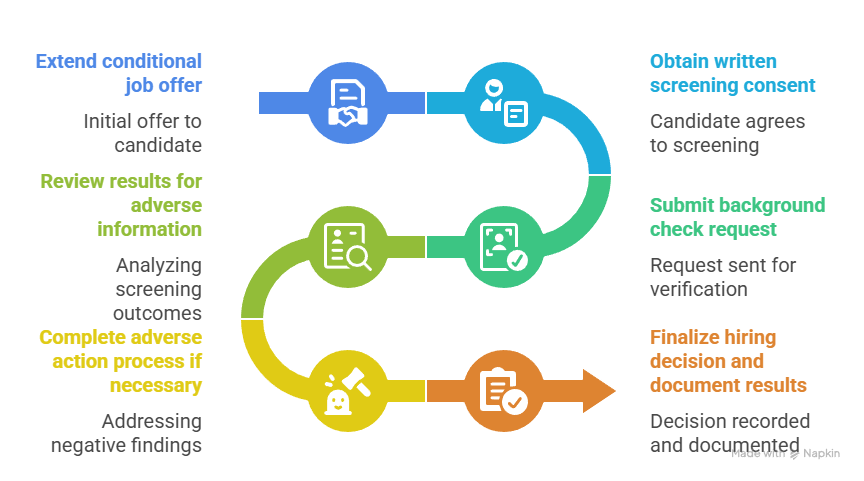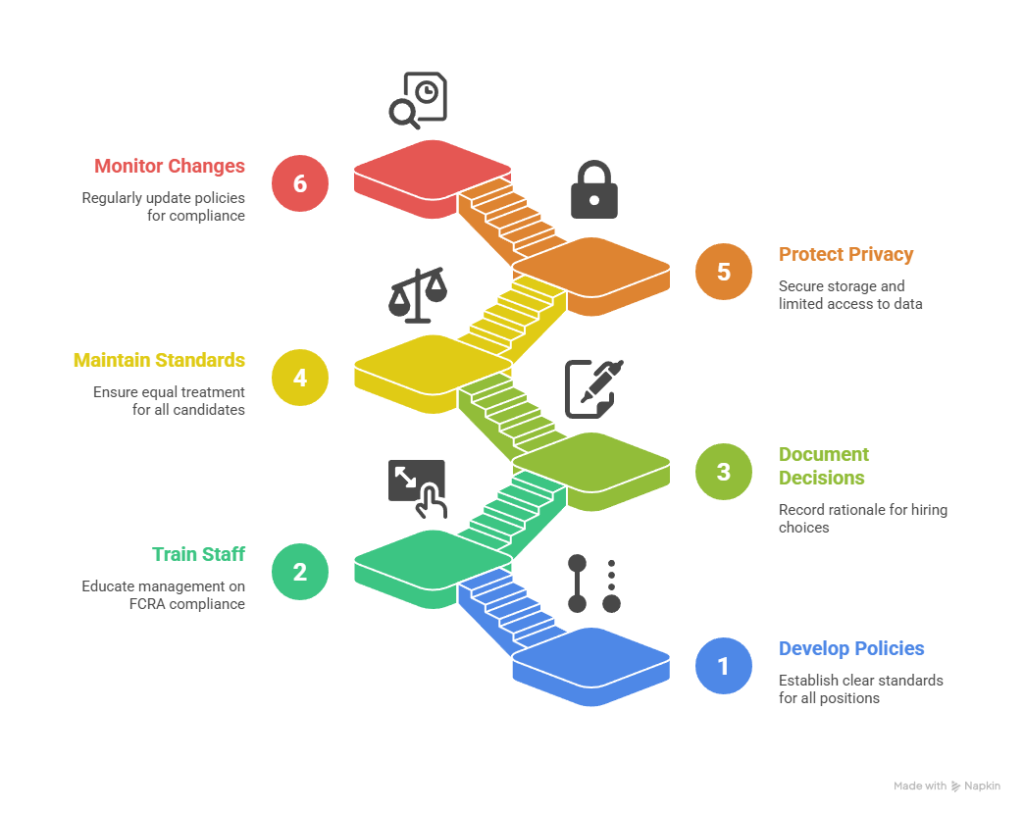Restaurant employee background checks are essential risk management tools that protect businesses from liability while ensuring customer safety and regulatory compliance. Implementing comprehensive screening procedures helps restaurants make informed hiring decisions and maintain operational integrity.
Key Takeaways
- Restaurant employee background checks reduce theft, improve customer safety, and demonstrate due diligence to insurance providers and regulatory agencies.
- Federal and state laws require specific background screening for food service positions, with penalties for non-compliance ranging from fines to license revocation.
- Comprehensive restaurant screening should include criminal history, employment verification, reference checks, and industry-specific certifications like food handler permits.
- Background check costs for restaurants typically range from $25-75 per candidate, with bulk pricing available for high-volume hiring establishments.
- Most restaurant background checks take 2-5 business days to complete, though complex searches may require up to 10 business days for thorough verification.
- Proper documentation and FCRA compliance are critical to avoid discrimination lawsuits and ensure fair hiring practices in the competitive food service industry.
Why Restaurant Employee Background Checks Matter
The restaurant industry faces unique challenges that make employee screening particularly critical for business success. High employee turnover, cash handling responsibilities, and direct customer interaction create elevated risks that proper background screening can significantly reduce. Restaurant owners who implement thorough screening processes protect their establishments from theft, violence, and reputation damage while building stronger, more reliable teams.
Studies show that restaurants experience employee theft rates 75% higher than other retail industries, with annual losses exceeding $3 billion nationwide. Background checks serve as the first line of defense against hiring individuals with histories of theft, violence, or drug-related offenses. Additionally, many insurance companies offer premium discounts to restaurants that maintain documented background screening policies, creating immediate cost savings that often offset screening expenses.
The food service industry's regulatory environment also demands careful attention to employee screening requirements. Health departments, liquor licensing boards, and franchise agreements frequently mandate background checks for specific positions. Failure to comply with these requirements can result in fines, license suspension, or franchise termination, making background screening a critical operational necessity rather than an optional precaution.
Legal Liability and Customer Safety
Restaurant employers face significant legal exposure when negligent hiring leads to customer harm or property damage. Courts increasingly hold businesses responsible for foreseeable risks that proper screening could have prevented, resulting in settlements that can exceed millions of dollars for serious incidents.
Customer safety concerns extend beyond violent crime to include issues like food tampering, sexual harassment, and drug use that can devastate a restaurant's reputation. Background screening helps identify candidates with relevant criminal histories before they gain access to food preparation areas, customer spaces, or sensitive business information.
Legal Requirements for Restaurant Background Screening
Federal and state regulations establish specific background check requirements for food service employees, with violations carrying serious consequences for restaurant operators. The Fair Credit Reporting Act (FCRA) governs how employers must conduct and use background screening information, requiring written consent, adverse action notices, and proper disposal of screening documents. Additionally, many states have implemented "Ban the Box" legislation that restricts when and how criminal history information can be considered during the hiring process.
Food service establishments serving alcohol face additional screening requirements under state liquor licensing laws. These regulations typically prohibit employment of individuals with specific criminal convictions, particularly those involving alcohol, drugs, or violent crimes. Some states maintain databases of individuals prohibited from working in alcohol-serving establishments, requiring employers to check these registries before extending job offers.
| Legal Requirement | Scope | Penalties for Non-Compliance |
| FCRA Compliance | All background checks | $100-$1,000 per violation |
| State Ban the Box | Criminal history timing | Fines up to $10,000 |
| Liquor License Requirements | Alcohol-serving positions | License suspension/revocation |
Restaurant franchisees must also comply with franchisor background screening requirements, which often exceed state and federal minimums. These corporate standards typically include specific criminal lookback periods, credit checks for management positions, and ongoing monitoring requirements that extend throughout employment.
Industry-Specific Regulations
Health departments increasingly require background checks for food handlers, particularly those working with vulnerable populations like children or elderly customers. These regulations often focus on convictions involving violence, theft, or drug offenses that could indicate risks to food safety or customer wellbeing.
Catering companies and institutional food service providers face additional screening requirements when working with schools, healthcare facilities, or government contracts. These enhanced background checks may include fingerprinting, federal database searches, and ongoing monitoring throughout the contract period.
Types of Background Checks for Restaurant Employees
Restaurant employee screening should encompass multiple verification components tailored to specific job responsibilities and risk levels. Entry-level positions typically require basic criminal history searches, employment verification, and reference checks, while management roles may need additional components like credit checks, education verification, and professional license validation. Understanding which screening elements provide the most value for different restaurant positions helps optimize both cost and effectiveness.
Criminal history searches form the foundation of restaurant background screening, but the scope and depth should vary based on job responsibilities. Kitchen staff and servers need comprehensive searches covering violent crimes, theft, and drug offenses, while delivery drivers require additional focus on traffic violations and license status. Management positions typically warrant extended lookback periods and multi-jurisdictional searches to ensure thorough coverage of potential risk factors.
Employment verification helps confirm work history accuracy and identify patterns that might indicate reliability issues. Restaurant-specific reference checks should focus on punctuality, cash handling experience, customer service skills, and reasons for leaving previous positions. These conversations often reveal information that formal background searches cannot detect, such as attendance problems or interpersonal conflicts that could affect team dynamics.

- Criminal History Search: County, state, and federal databases for convictions
- Employment Verification: Previous job titles, dates, and performance
- Reference Checks: Personal and professional character assessments
- Motor Vehicle Records: For delivery drivers and management positions
- Social Security Verification: Identity confirmation and address history
- Professional License Verification: Food handler permits and certifications
Credit checks may be appropriate for management positions involving financial responsibilities, but many states restrict credit screening for hourly employees. Drug testing, while not technically a background check, often accompanies pre-employment screening for restaurant positions due to safety and liability concerns.
Position-Specific Screening Requirements
Management positions require comprehensive screening that includes financial background verification, extended criminal history searches, and professional reference validation. These roles involve cash handling, inventory management, and supervisory responsibilities that demand higher screening standards than entry-level positions.
Front-of-house staff need screening focused on customer interaction risks, including violent crime history, theft convictions, and sexual offense searches. Back-of-house employees require similar criminal screening plus specific attention to drug-related offenses that could affect food safety and kitchen equipment operation.
The Restaurant Background Check Process
Implementing an effective restaurant background check process requires systematic procedures that ensure consistency, legal compliance, and timely completion. The process typically begins during the application review phase, when employers identify candidates worthy of screening investment. Establishing clear criteria for which positions require background checks helps streamline decision-making and ensures resources focus on the most critical hiring decisions.
Obtaining proper candidate consent represents a crucial early step that must comply with FCRA requirements and state-specific regulations. The consent process should clearly explain what information will be searched, how it will be used, and what rights candidates possess regarding the screening results. Many restaurants combine background check consent with other hiring paperwork to improve efficiency, but consent forms must remain separate documents to maintain legal compliance.
Timing coordination ensures background checks complete before scheduled start dates while avoiding unnecessary delays in the hiring process. Most restaurant positions can begin the screening process immediately after conditional job offers, allowing 3-5 business days for completion before new employee orientation. Rush processing options are available for urgent hiring needs, though expedited services typically cost 50-100% more than standard turnaround times.

- Step 1: Extend conditional job offer
- Step 2: Obtain written screening consent
- Step 3: Submit background check request
- Step 4: Review results for adverse information
- Step 5: Complete adverse action process if necessary
- Step 6: Finalize hiring decision and document results
Quality background check providers offer online portals that allow real-time status monitoring and automatic result notifications. These systems help restaurant managers track multiple candidates simultaneously while maintaining organized records for compliance purposes.
What Shows Up on Restaurant Employee Background Checks
Restaurant background checks typically reveal criminal convictions, employment history, and identity verification information relevant to food service positions. Criminal records include felony and misdemeanor convictions, though pending charges and arrests without convictions may have limited visibility depending on state laws. The lookback period for criminal searches usually extends seven years for most positions, though serious felonies and management roles may warrant longer search periods.
Employment verification confirms job titles, employment dates, eligibility for rehire, and sometimes performance information from previous employers. Restaurant industry employment verification can be challenging due to high business turnover rates and informal record-keeping practices at smaller establishments. Professional reference checks often provide more detailed information about work performance, reliability, and interpersonal skills than formal employment verification processes.
| Background Check Component | Information Revealed | Typical Turnaround Time |
| Criminal History | Convictions, sentencing, case details | 1-3 business days |
| Employment Verification | Job titles, dates, rehire eligibility | 2-5 business days |
| Reference Checks | Performance, character, reliability | 3-7 business days |
Motor vehicle records for delivery positions show traffic violations, license suspensions, and accident history that could indicate liability risks. Social Security verification confirms identity and reveals address history that helps ensure comprehensive geographic coverage in criminal searches. Professional license verification confirms food handler certifications, alcohol service permits, and other industry-specific credentials.
Credit reports, when legally permissible, reveal financial responsibility and potential theft risks for positions involving cash handling or financial management. However, many states restrict credit screening for restaurant positions, and employers must demonstrate clear business necessity to justify these searches.
Red Flags in Restaurant Background Checks
Violent crime convictions pose significant liability risks for restaurants, particularly those involving assault, domestic violence, or weapons charges. These convictions may indicate potential risks to customers and coworkers, though employers must consider factors like conviction age, rehabilitation evidence, and job relatedness before making adverse decisions.
Theft-related convictions require careful evaluation based on job responsibilities and conviction circumstances. Employee theft, shoplifting, and fraud convictions may indicate higher risks for positions involving cash handling, inventory management, or unsupervised customer interaction.
Costs and Timeline for Restaurant Background Checks
Restaurant background check costs vary significantly based on screening components, provider selection, and volume pricing arrangements. Basic criminal history searches typically cost $15-35 per candidate, while comprehensive packages including employment verification and references range from $45-75 per screening. High-volume restaurants can often negotiate bulk pricing that reduces per-screening costs by 20-40% compared to individual searches.
Timeline expectations for restaurant background screening typically range from 2-5 business days for standard packages, though complex searches may require up to 10 business days for completion. Criminal history searches usually complete within 24-48 hours, while employment and reference verification can extend timelines due to third-party response delays. Expedited processing is available from most providers for urgent hiring needs, typically adding $10-25 to standard pricing.
Cost-benefit analysis shows that background screening expenses are typically offset by reduced employee theft, lower insurance premiums, and decreased turnover costs. Industry studies indicate that restaurants implementing comprehensive background screening experience 25-40% reductions in employee theft incidents and 15-20% improvements in employee retention rates. These operational improvements often justify screening costs within the first year of implementation.
- Basic Criminal Search: $15-35 per candidate
- Employment Verification: $10-25 per previous employer
- Professional References: $15-30 per reference contact
- Motor Vehicle Records: $8-15 per search
- Comprehensive Package: $45-75 per candidate
- Rush Processing: Additional $10-25 fee
Payment options include per-search billing, monthly account arrangements, and prepaid credit systems that offer volume discounts. Many restaurants prefer monthly billing cycles that align with payroll processing and simplify budgeting for screening expenses.
ROI Analysis for Restaurant Screening Programs
Employee theft reduction represents the most measurable return on investment for restaurant background screening programs. Industry data shows that comprehensive screening can reduce theft incidents by $2,000-5,000 per year for typical full-service restaurants, far exceeding annual screening costs of $500-1,500 for most establishments.
Insurance premium reductions and liability protection provide additional value that compounds over time. Many insurance carriers offer 5-15% premium discounts for documented background screening policies, creating ongoing savings that continue beyond the initial screening investment.
Best Practices for Restaurant Hiring Managers
Successful restaurant background screening requires consistent policies, proper documentation, and clear communication throughout the hiring process. Establishing written background check policies ensures all candidates receive equal treatment while protecting employers from discrimination claims. These policies should specify which positions require screening, what components will be included, and how adverse information will be evaluated in hiring decisions.
Training hiring managers on FCRA compliance and state-specific regulations prevents costly violations that can result in lawsuits and regulatory penalties. Key training topics include proper consent procedures, adverse action requirements, and prohibited discrimination practices that could create legal liability. Regular training updates ensure staff stay current with evolving regulations and industry best practices.
Documentation requirements extend beyond the screening process to include decision rationale, adverse action communications, and record retention procedures. Proper documentation demonstrates fair hiring practices and provides legal protection if hiring decisions are challenged. Most employment attorneys recommend maintaining background check records for at least three years, though some states require longer retention periods.

- Develop written screening policies: Clear standards for all positions
- Train management staff: FCRA compliance and legal requirements
- Document all decisions: Rationale for hiring and rejection choices
- Maintain consistent standards: Equal treatment for all candidates
- Protect candidate privacy: Secure storage and limited access
- Monitor legal changes: Regular policy updates for compliance
Communication with candidates should emphasize the screening process as a standard business practice rather than suspicion of wrongdoing. Transparency about screening components and timelines helps maintain positive candidate relationships while setting appropriate expectations for the hiring timeline.
Common Mistakes to Avoid
Inconsistent screening practices create discrimination risks and legal liability for restaurant employers. Applying different screening standards to similar positions or making exceptions for preferred candidates can support discrimination claims and regulatory violations.
Inadequate adverse action procedures represent another common compliance failure that can result in significant legal penalties. Employers must provide proper notice, allow dispute opportunities, and document decision-making processes to maintain FCRA compliance.
Conclusion
Restaurant employee background checks serve as essential tools for protecting businesses, customers, and existing staff from preventable risks while ensuring regulatory compliance. The investment in comprehensive screening programs typically pays for itself through reduced theft, lower insurance costs, and improved employee retention rates. Implementing systematic screening procedures with proper legal compliance creates competitive advantages while building stronger, more reliable restaurant teams.
Successful background screening requires understanding industry-specific requirements, choosing appropriate screening components, and maintaining consistent policies that protect both employers and job candidates. As the restaurant industry continues evolving, background screening will remain a critical component of effective risk management and operational success.
Frequently Asked Questions
What background checks do restaurants need to run on employees?
Restaurants typically need criminal history searches, employment verification, and reference checks for most positions. Management roles may require additional components like credit checks and extended criminal searches. Specific requirements vary by state, with some mandating background checks for food handlers or alcohol service positions.
How long do restaurant background checks take to complete?
Most restaurant background checks take 2-5 business days to complete, depending on the screening components included. Criminal history searches usually finish within 24-48 hours, while employment verification and reference checks may take longer due to third-party response times. Expedited processing is available for urgent hiring needs.
Are background checks required by law for food service workers?
Background check requirements for food service workers vary by state and local jurisdiction. Some states mandate screening for specific positions, particularly those involving alcohol service or food handling. Additionally, health departments and licensing agencies may require background checks for certain restaurant employees.
How much do restaurant employee background checks cost?
Restaurant background checks typically cost $25-75 per employee, depending on the screening components included. Basic criminal searches start around $15-35, while comprehensive packages with employment verification and references range $45-75. Volume discounts are available for restaurants with regular hiring needs.
Can restaurants hire someone with a criminal record?
Restaurants can often hire individuals with criminal records, but must consider factors like conviction relevance, time elapsed, and rehabilitation evidence. "Ban the Box" laws in many states restrict when criminal history can be considered, and employers must demonstrate job-relatedness for any adverse hiring decisions based on criminal records.
What disqualifies someone from working in a restaurant?
Common disqualifying factors include recent violent crime convictions, theft-related offenses, drug trafficking charges, and sex crimes. For alcohol-serving positions, DUI convictions may be disqualifying. However, automatic disqualification policies are discouraged, and employers should conduct individualized assessments considering conviction age and job duties.
Additional Resources
- Fair Credit Reporting Act (FCRA) Compliance Guide for Employers
https://www.ftc.gov/business-guidance/resources/using-consumer-reports-what-employers-need-know - Equal Employment Opportunity Commission Background Check Guidelines
https://www.eeoc.gov/laws/guidance/arrest-and-conviction-records-employment-decisions-under-title-vii - Society for Human Resource Management Background Screening Resources
https://www.shrm.org/topics-tools/tools/toolkits/background-checks - National Restaurant Association Employment Law Resources
https://restaurant.org/manage-my-restaurant/employment-legal/employment-law - Professional Background Screening Association Best Practices
https://www.thepbsa.org/background-screening-best-practices - State-by-State Ban the Box Legislation Guide
https://www.nelp.org/campaigns/ensuring-fair-chance-work/
Gcheck Editorial Team
Meet the GCheck Editorial Team, your trusted source for insightful and up-to-date information in the world of employment background checks. Committed to delivering the latest trends, best practices, and industry insights, our team is dedicated to keeping you informed.
With a passion for ensuring accuracy, compliance, and efficiency in background screening, we are your go-to experts in the field. Stay tuned for our comprehensive articles, guides, and analysis, designed to empower businesses and individuals with the knowledge they need to make informed decisions.
At GCheck, we're here to guide you through the complexities of background checks, every step of the way.





